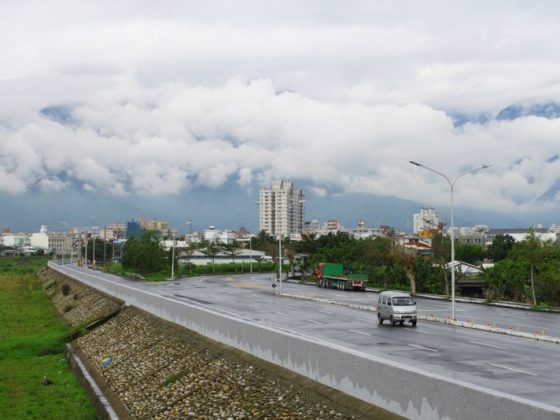text |Ellie Olcott
Before coming to Taiwan to study Chinese, my language school required me to give them a Chinese name. I didn’t put much thought into coming up with a new name. Indeed, I just asked Google for a phonetic approximation of my English name, Ellie Olcott, in Chinese. It spat out敖恩靈, and thus I became Áo En Líng.
In hindsight, perhaps blindly placing faith in Google for something so important was not the best idea.
“Your name has too many strokes”, I kept hearing from Taiwanese friends, “you should definitely change it.”
This kindly advice did not just stem from concern that I wouldn’t be able to remember how to write my name.
It also came from the fact that in Taiwan, the practice of changing one’s name is pretty common. What would be considered unusual, even raise a few eyebrows back home in Britain, is normalised in Taiwan. So much, in fact, that there’s even legislation in Taiwan specifically to regulate and facilitate the changing of one’s name.
Ke Yun (可昀) was only four the first time she was brought to a fortune teller to have her name changed. Like many children her age, Ke Yun cried a lot. Her grandmother attributed this to her being uncomfortable with her own name, which, according to Chinese thought, possessed a number of strokes that was misaligned with the child’s date and time of birth.
Believing a more auspicious name might stop the child’s tears, Ke Yun’s grandmother took her to a nearby suan ming shi, or fortune teller. Based on calculations made from her birthday and number of strokes in her name, the fortune teller agreed that, yes, the child’s name was at least partly to blame, and suggested 雅勻 (Ya Yun) as an alternative.
For the next 15 years, Ke Yun would be known as Ya Yun.
Until Ya Yun turned 20, at which point she decided to change her name again, reverting back to her birth-name of Ke Yun.
“I thought the name given by the fortune-teller was common and old-fashioned,” says Ke Yun. “It didn’t say anything about me.”
Ke Yun’s story is not uncommon. Under the Taiwanese “Name Act” individuals are permitted to change their names a maximum of three times in their lifetime. Applications to change names must include a reason, which can vary from sharing the same name as a criminal suspect, changing religion, or having an “unflattering” name. As the government declines the authority of judging what constitutes an “unflattering” name, citizens are at liberty to decide themselves when to make such changes.
The ease at which Taiwanese citizens can change their names (alongside the custom of fortune-tellers ascribing bad luck to ill-fortuned names) makes the practice prevalent in Taiwan. In New Taipei City alone, 1,142 citizens changed their name for the third (and legally last) time between May, 2015 and January, 2017. Amongst these three time name-changers, 60% were women and 40% were men.
According to a spokesperson from the New Taipei City Government, most applications for names changes are made by people between the ages of 31 to 50.
“This is a pivotal period of change in life when people seek out a new name as a way to secure better fortune,” said the spokesperson.
For many Taiwanese who feel that they are suffering misfortune, a name change feels like a way to take control of one’s own destiny. In Taiwan, it is often said that fortune favors those who take actions designed to improve one’s own lot in life; even small actions like wearing bright auspicious colours during certain holidays, are thought of as ways to bring good luck.
Changing one’s own name, though certainly more extreme, is another way to take control of one’s own destiny.
The prevalence of the practice has given rise to a cottage industry of fortune tellers specializing in giving advice on auspicious name changes. The most reputable of these can charge upwards of NTD 100,000 (around $3,500) for such advice. Less expensive outlets can be found operating near most local temples.
Thanks to the advice of more than one well-meaning friend, I sought out the services of Teacher Xie (謝老師), who runs a small operation specializing in auspicious name changes parked between a busy main road and local temple in Taipei’s Banqiao district.
A serious man, Teacher Xie didn’t crack a smile as he went to work, counting the strokes in my name and flipping through his well-worn yellow book of Chinese names as the faint clanking of prayer sticks as well as the stuttering of nearby motorbikes provided the backdrop for our consultation.
I asked him if he needed any other details about my life outside of my name, birth date and time. He told me that nothing else mattered for his work.
After consulting his books, Teacher Xie said he saw why my name might be giving me grief, claiming that it was harming not just my relations with my mother and the opposite sex, but also weakening my blood and eyesight. These misfortunes, according to teacher Xie, began for me in September of 2017, which was exactly the time I began using the name Áo En Líng at my language school in Taipei.
Was he right? Had my haphazard choice of a Chinese name turned my fortunes sour? Perhaps my having broken that bottle of oil in school earlier that day was due to my weakened eyesight. Was my weak blood responsible for the cold I was suffering?
Perhaps I should take Teacher Xie’s advice and allow him to guide me along the process of changing my Chinese name. But before I did this, I decided to give my mum a call. Our jovial conversation made me doubt Teacher Xie’s earlier edict about our relationship, leading me to believe that his edict might not be 100% accurate. In the end, I decided – in part, perhaps, because of the conversation with my mother, and in part out of a desire to not have to learn to write three new characters – to stick with my old name.
Looking for a fortune teller experience in Taiwan? MyTaiwanTour’s Vintage Taipei tour will give you a backstage pass to Taipei’s history and a new perspective on the rich origins of our beautiful city.
About the author
Ellie Olcott (who also responds to Áo En Líng) is a British freelance journalist based in Taipei. In between preparing for Chinese class at the National Taiwan University, she goes about exploring the city, indulging in Taipei’s best food, and maybe even finding some time to write.
Read more:
A Fine Pair – Siraya National Scenic Area and Chiayi City
Gods Rush In at the King Boat Festival
Chinese New Year in Taiwan part two: Gift giving, etiquette and more











